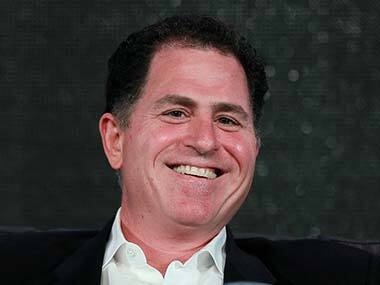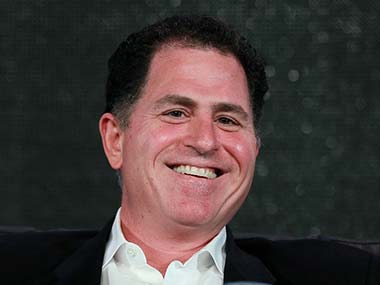byShonali Advani
The National Association of Software and Services Company (NASSCOM) hosted an evening with Michael Dell, Founder and CEO of the world’s third largest PC maker, Dell, on 3 June in Bengaluru. The programme was part of its 10,000 Startups initiative launched in March 2013, to catalyze technology entrepreneurship in India. The highlight of the evening was a fire side chat where founders of four Indian technology startups shared stage with the CEO and got an opportunity to discuss technology and entrepreneurship.
Som Mittal, President, NASSCOM, opened the evening in a conversation with the CEO on his reasons for shaping Dell from a PC manufacturer to a full solutions company in a crowded market.
[caption id=“attachment_841209” align=“alignright” width=“380”]  AFP[/caption]
“What we found in our business as we grew was that just having products was limiting to what we could really do for our customer. The problems and challenges customers brought to us required more than just products. They wanted us to know their businesses to help them solve new challenges. So we needed combination of software and hardware to address these challenges. It also opens up a much larger market,” he said.
The focus area of the evening, the fire side chat, had Varun Singh, Founder and CEO, ScaleArc; Avira Tharakan, CEO, Myeasydocs; Joydeep Sen Sarma, Co-Founder and Head Qubole India; and Mir Abid Hussain, Co-founder and CEO, EMO2 the four innovative startups on stage with Dell, who discussed three key themes - innovation and strategy; starting-up and entrepreneurship; followed by technology and trends.
Impact Shorts
More ShortsAnswering Singh’s question on taking technology products to a global market, Dell affirmed the best way to do this was to sell in one country at a time.
This was followed by Hussain’s query around the importance of customer feedback and its role in the overall strategy of a company. Dell mentioned they have an interaction with 2 billion customers every single year. “We have a social media command center to listen and engage with customers world over; that knowledge is powerful to make us a better company,” he affirmed.
When asked about the importance of protecting intellectual property (IP) for a startup by Hussain again, Dell said it completely depends on the nature of IP. “For a young a company, remember that the primary purpose of IP is defending what you do. Where you get into trouble is when you have patents and a large company tries to eat you up.”
Mentioning that Dell as a company has 5000-6000 patents they issue and apply for, he said, “We have patents on everything which can confuse any trial.”
Advising aspiring and first generation entrepreneurs he urged them to act and build fast. “Planning is fine but generally over-rated. A new entrepreneur has to manage looking at things with a fresh set of eyes. That is the beauty a new business.”
Sharing insights on potential growth areas in IT sector, the CEO stated that most growth in global economies is occurring in small medium sized business. One reason for this is because these businesses are getting access to tools and technologies that were typically only available to bigger enterprises.
Highlighting opportunities in the IT sector, he said, “Look at the number of devices connected together, how fast that is growing, as costs come down and look at how much data they are creating. It is not out of the question that by 2020 we will have 10 devices per human that is 70 billion devices. All this brings new business opportunities.”
Speaking of his personal experience and approach to entrepreneurship Dell said, “I did business with a fear of failure. The good thing for me is that I was not going out and seeking a lot of advice from people. If I did, they would have tried to dissuade me or told me it wouldn’t work. Entrepreneurs have to be a little bit crazy.”
Dell has a proposed to buy-back the Texas-based firm he founded as a student which went public twenty five years ago. Outlining his plans for the company going private, Dell said it will accelerate the firm’s transformation. The plan is to make investments in research and development, software and services, adding sales people, and growing ability in client businesses. However, Dell admitted that investments in the company’s business are not going to be attractive in the short term. “I think they are right investments to make and probably unattractive to public shareholders. But it allows us a change of frame in a long term horizon and that is very attractive,” he stated.
Shonali Advani works for Entrepreneur magazine


)

)
)
)
)
)
)
)
)



